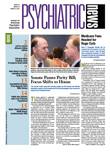The U.S. Senate and House of Representatives passed, and President Bush signed, compromise legislation in late September to give the Food and Drug Administration (FDA) increased resources and power to regulate safety of prescription drugs (see also
Law Ensures Public Access to Clinical Trial Disclosures).
The Prescription Drug User Fee Act (PDUFA) was originally enacted in 1992 to fund timely new drug approval reviews within the agency and was up for review and renewal by the end of September.
In renewing PDUFA, the FDA Amendments Act (FDAAA) (HR 3580), Congress raised the user fees paid by pharmaceutical companies to the FDA by 25 percent, with these fees authorized through 2012.
According to a summary of the FDAAA prepared by the House Committee on Energy and Commerce, the increased user fees will fund enhancements in the agency's review process for new drug and product applications, safety reviews, and postmarketing surveillance, including increased monitoring of direct-to-consumer drug advertisements.
The FDAAA also reauthorizes the Pediatric Research Equity Act, which gives the agency the power to require pediatric studies to be included in certain new drug applications. The Best Pharmaceuticals for Children Act, which extends marketing or patent exclusivity for an additional six months to manufacturers who comply with FDA's requests to conduct pediatric clinical trials, has been renewed as well.
Safety alarms associated with a number of approved,“ blockbuster” drugs such as rofecoxib (Vioxx) and rosiglitazone (Avandia) have made headlines in recent years and caused much criticism of the FDA's ability to protect the public. Responding to those concerns, the FDAAA contains provisions that seek to strengthen the FDA's regulation of the safety of marketed drugs. For example, the agency now has clearly defined authority to request that postmarketing clinical trials be conducted by manufacturers, demand labeling changes, and impose monetary penalties for violations.
However, the bill stops short of allowing the agency to ban television ads that are considered misleading or false, a proposal in an earlier version of the bill that was opposed by broadcasters, the advertising industry, and the pharmaceutical industry, as reported by American Public Media's news program“ Marketplace.”
The FDAAA retains a provision in an earlier House version of the bill that would expand the current online clinical trial registry, operated by the National Library of Medicine, into a searchable public clinical trial databank and place the director of National Institutes of Health in charge of making specific rules about this process. All U.S. clinical trials will be required to register prospectively in the databank, and brief results of clinical trials conducted on approved drugs will also be required to be posted.
The FDAAA can be accessed at<http://thomas.loc.gov> by searching on the bill number, HR 358; a summary of the bill prepared by the House Committee on Energy and Commerce is posted at<energycommerce.house.gov/FDA%20Amendments/Summary.pdf>.▪
